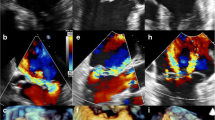Opinion statement
In chronic, severe mitral regurgitation (MR), cardiac function can remain well compensated and patients can remain asymptomatic for many years. Eventually, in most patients, the originally favorable loading conditions give way to unfavorable remodeling, which results in left ventricular (LV) dysfunction and dilation, and ultimately symptoms of pulmonary congestion. Symptomatic, chronic severe MR is a clear indication for surgical correction. However, the optimal management of asymptomatic patients is less clear. While asymptomatic severe MR patients who have developed LV dysfunction or LV dilation warrant surgery, the decision to operate without these findings hinges on the presence of other clinical sequelae, such as atrial arrhythmias and pulmonary hypertension, and on the likelihood of successful mitral valve repair. Controversy exists as to the optimal approach to patients without any of these objective triggers, with some evidence supporting earlier prophylactic surgery and other evidence supporting a “watch and wait” approach. It is our conviction that in absence of an established guideline-based indication for surgical correction, for most asymptomatic patients with chronic severe MR, the preferred approach is close monitoring with serial echocardiography for development of symptoms or other clinical sequelae. However, it is reasonable to consider earlier surgical correction in select asymptomatic patients in whom there is a high likelihood of successful mitral valve repair. In this paper, we comprehensively review all guideline-based management of asymptomatic chronic severe MR, and discuss new evidence that impacts clinical decision-making in these patients.

Similar content being viewed by others
References and Recommended Reading
Papers of particular interest, published recently, have been highlighted as: • Of importance •• Of major importance
Bonow RO, et al. ACC/AHA 2006 guidelines for the management of patients with valvular heart disease: a report of the American college of cardiology/american heart association task force on practice guidelines (writing Committee to Revise the 1998 guidelines for the management of patients with valvular heart disease) developed in collaboration with the society of cardiovascular anesthesiologists endorsed by the society for cardiovascular angiography and interventions and the society of thoracic surgeons. J Am Coll Cardiol. 2006;48(3):e1–e148.
Otto CM. Timing of surgery in mitral regurgitation. Heart. 2003;89(1):100–5.
Capomolla S, et al. Beta-blockade therapy in chronic heart failure: diastolic function and mitral regurgitation improvement by carvedilol. Am Heart J. 2000;139(4):596–608.
Bisno AL. Group A streptococcal infections and acute rheumatic fever. N Engl J Med. 1991;325(11):783–93.
O'Brien KD, et al. Apolipoproteins B, (a), and E accumulate in the morphologically early lesion of ‘degenerative’ valvular aortic stenosis. Arterioscler Thromb Vasc Biol. 1996;16(4):523–32.
Otto CM, et al. Characterization of the early lesion of ‘degenerative’ valvular aortic stenosis. Histological and immunohistochemical studies. Circulation. 1994;90(2):844–53.
Rosen SE, et al. Natural history of the asymptomatic/minimally symptomatic patient with severe mitral regurgitation secondary to mitral valve prolapse and normal right and left ventricular performance. Am J Cardiol. 1994;74(4):374–80.
Schuler G, et al. Temporal response of left ventricular performance to mitral valve surgery. Circulation. 1979;59(6):1218–31.
Zile MR, et al. Chronic mitral regurgitation: predictive value of preoperative echocardiographic indexes of left ventricular function and wall stress. J Am Coll Cardiol. 1984;3(2 Pt 1):235–42.
Grayburn PA. Should we operate on asymptomatic patients with severe mitral regurgitation? JACC Cardiovasc Imaging. 2008;1(2):142–4.
Grigioni F, et al. Atrial fibrillation complicating the course of degenerative mitral regurgitation: determinants and long-term outcome. J Am Coll Cardiol. 2002;40(1):84–92.
Detaint D, et al. Management of asymptomatic patients with severe non-ischaemic mitral regurgitation. Are practices consistent with guidelines? Eur J Cardiothorac Surg. 2008;34(5):937–42.
Enriquez-Sarano M, et al. Quantitative determinants of the outcome of asymptomatic mitral regurgitation. N Engl J Med. 2005;352(9):875–83.
Gillam LD, Schwartz A. Primum non nocere: the case for watchful waiting in asymptomatic “severe” degenerative mitral regurgitation. Circulation. 2010;121(6):813–21. discussion 821.
Enriquez-Sarano M, Sundt 3rd TM. Early surgery is recommended for mitral regurgitation. Circulation. 2010;121(6):804–11. discussion 812.
Bech-Hanssen O, et al. Mortality after mitral regurgitation surgery: importance of clinical and echocardiographic variables. Eur J Cardiothorac Surg. 2003;24(5):723–30.
Enriquez-Sarano M, et al. Echocardiographic prediction of survival after surgical correction of organic mitral regurgitation. Circulation. 1994;90(2):830–7.
Enriquez-Sarano M, et al. Echocardiographic prediction of left ventricular function after correction of mitral regurgitation: results and clinical implications. J Am Coll Cardiol. 1994;24(6):1536–43.
Lee EM, Shapiro LM, Wells FC. Mortality and morbidity after mitral valve repair: the importance of left ventricular dysfunction. J Heart Valve Dis. 1995;4(5):460–8. discussion 469–70.
Tribouilloy CM, et al. Impact of preoperative symptoms on survival after surgical correction of organic mitral regurgitation: rationale for optimizing surgical indications. Circulation. 1999;99(3):400–5.
Tribouilloy C, et al. Survival implication of left ventricular end-systolic diameter in mitral regurgitation due to flail leaflets a long-term follow-up multicenter study. J Am Coll Cardiol. 2009;54(21):1961–8.
Rosenhek R, et al. Outcome of watchful waiting in asymptomatic severe mitral regurgitation. Circulation. 2006;113(18):2238–44.
Grigioni F, et al. Outcomes in mitral regurgitation due to flail leaflets a multicenter European study. JACC Cardiovasc Imaging. 2008;1(2):133–41.
Ling LH, et al. Early surgery in patients with mitral regurgitation due to flail leaflets: a long-term outcome study. Circulation. 1997;96(6):1819–25.
Gammie JS, et al. Trends in mitral valve surgery in the United States: results from the society of thoracic surgeons adult cardiac surgery database. Ann Thorac Surg. 2009;87(5):1431–7. discussion 1437–9.
Carabello BA. Is it ever too late to operate on the patient with valvular heart disease? J Am Coll Cardiol. 2004;44(2):376–83.
Ling LH, et al. Clinical outcome of mitral regurgitation due to flail leaflet. N Engl J Med. 1996;335(19):1417–23.
Yun KL, et al. Randomized trial comparing partial versus complete chordal-sparing mitral valve replacement: effects on left ventricular volume and function. J Thorac Cardiovasc Surg. 2002;123(4):707–14.
Disclosure
No potential conflicts of interest relevant to this article were reported.
Author information
Authors and Affiliations
Corresponding author
Rights and permissions
About this article
Cite this article
Sparano, D.M., Ward, R.P. Management of Asymptomatic, Severe Mitral Regurgitation. Curr Treat Options Cardio Med 14, 575–583 (2012). https://doi.org/10.1007/s11936-012-0207-4
Published:
Issue Date:
DOI: https://doi.org/10.1007/s11936-012-0207-4




